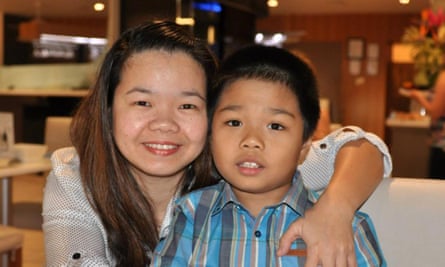An 11-year old Australian boy angry that his 10-year-old friend faced deportation from Australia because he has autism expressed his frustration to panellists on the ABC’s Q&A program on Monday night.
Asking the panel a question via video link, Ethan Egart shared the story of his friend Tyrone, who came to Australia from the Philippines.
“On 27 April our government is going to deport a 10-year-old boy who is perfectly normal in every way,” Ethan said.
“He can read and ride a bike, but he has autism. I went to after-school care with this boy and he can’t speak, but he can use sign language to communicate with us.
“If he can get along with us and we can get along with him, why does he have to leave?”
Tyrone’s mother is a nurse and the government had granted her a skilled working visa, but show host Tony Jones explained, “now the immigration department know he [Tyrone] has got autism, they’re being deported because he may be a burden on the health system here”.
The panellists included the trade minister, Andrew Robb, who is also a former parliamentary secretary to the minister for immigration and multicultural affairs.
Robb told the audience at Melbourne’s Recital Centre that the immigration minister, Peter Dutton, had the authority to overturn such decisions to deport.

“In 12 months I had quite a lot of these cases [come before me],” Robb said.
“There’s not one where I didn’t allow the young person to stay in this country.
“The department has got a set of rules so that if someone comes into Australia and they bring someone with them … so that they’re not taking advantage, I’m not saying this women is at all … but the department’s got the rules.
“The administrative appeals tribunal has the same rules. The minister has the discretion.”
Guardian Australia has contacted Dutton’s office for comment.
The founder and chief executive of the Young and Well Cooperative Research Centre, Associate Professor Jane Burns, said Ethan’s questions showed that young people cared about issues such as disability and stigma.
Burns said her eldest son, Angus, had Down’s syndrome and autism.
“He is non-verbal but he gives back to the community because it is about acceptance of disability, supporting those who are vulnerable and supporting families to look after the people that they care about,” she said.
It would be wrong to send Tyrone back to the Philippines, “a country he doesn’t know”, she said.
Several months ago Tyrone’s mother, Maria Sevilla, launched a change.org petition calling on the immigration department to allow her and Tyrone to stay. As of Tuesday afternoon, it had more than 89,000 signatures.
“I’ve worked for years, raising my son and studying to be a nurse,” she wrote. “Yet all of it could be taken away because the government thinks that children with autism are going to be more of a cost to Australian society than a benefit – but that’s just not true!
“Tyrone is not a burden, he is a joy. The idea that he can’t contribute because of his condition is just wrong.”
Sevilla said she brought Tyrone to Australia in 2007, when he was two-and-a-half years old. He was diagnosed with autism six months later, she said.
“I studied nursing at Tafe and then at uni and now I’m employed at Townsville hospital, North Queensland,” she said.
“I’ve worked for a year as a registered nurse and just been promoted to a clinical position. All we want to do is stay in Australia and keep working: caring for patients at work and supporting my son at his play.”
Sevilla said most of her family was in Australia. If Sevilla and Tyrone were forced to return to the Philippines she would have no support network.
“We’d have to be able to start all over again. Tyrone would need to learn everything – from communicating, getting used to the environment and getting used to people around him,” she said.
“I’m hoping Tyrone has more chances for a better future if we stay here in Australia. If we stay here I am able to work here as a nurse and able to provide support for him.”
“As a mother, if a parent would be in this situation, I don’t know how they would cope with hearing their son would be a burden to society, and knowing that your child won’t be able to speak up for whatever rights he has.”
She said Tyrone has not yet seen his friend on Q&A.
“It’s really nice of Ethan to be passionate about fighting for Tyrone’s rights because he knows Tyrone has this disability,” said Sevilla.
“You can see in his face the passion and the angst, fighting for Tyrone, it’s as if he is Tyrone’s brother, not his friend.”
Sevilla is submitting a ministerial intervention application this week.
The petition will be delivered to Dutton on Monday.
Comments (…)
Sign in or create your Guardian account to join the discussion